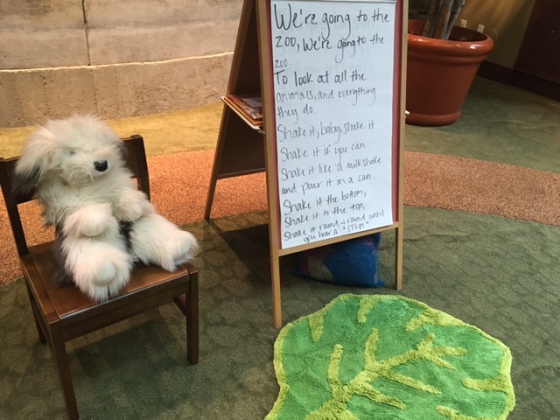
Hey, y’all! Welcome back to this new series that’s about how my career evolved and what I’ve learned and can share with other new library professionals. If you haven’t read the first post about choosing an MLIS program, you can do that here.
Today, I’m talking about my weird and wonderful first library gig.
It began with volunteering.
I’d just enrolled in an MLIS program when I went into my public library for the first time to ask for a volunteer application. Although I’d lived in the town for six months, I’d never signed up for a library card because I found the rules online and learned that I didn’t qualify for free membership because I lived a quarter mile outside the city limits. In order to get a card, I would have needed to pay $55 for a year and it was money that I didn’t have as a struggling newlywed in a new place. If I was accepted as a volunteer, I could have a library card for free and access to professionals who might be good resources to me, so this was a win win.
I filled out the application in the library and worked up some nerve to tell the librarian at the reference desk that I’d just enrolled in library school. She went from apathetic to happy immediately and introduced me to the volunteer supervisor. I made a good impression when I told her I’d love to do anything that was helpful.
Anything helpful, as it turned out, was shelf-reading for two hours twice a week. Most volunteers hated the work, and since they were mostly retired women, they had a more difficult time reaching high and low shelves. It made sense for me to inherit the job and I actually didn’t mind. I dressed well, wore a volunteer pin, and listened to music while I worked. I was on time and reliable, and I called if I wasn’t going to come in. Sometimes I got to talk to the staff about projects for school and we had some interesting conversations.
A few months in, I was offered a part-time job in circulation and I was thrilled when it paid $16 an hour. I thought I was rich. A year into my marriage and life away from home, I finally had enough money for some small luxuries like date nights and more expensive groceries.
Circulation is a good place to start.
A lot of library professionals I know started out in circulation positions and I think that’s actually a great beginning in libraries. The circulation desk is often the first greeting place, sets the tone for customer service in the library, and controls access for better or worse.
It was the only place in that small-town library where there was more than one person working in a single type of position, so I had co-workers who became close peers to me. Everyone I worked with was much older, but both of the other women at circulation were retired from other careers and became work-moms to me.
Still, there was a lot I didn’t like.
This particular library reflected its local government in a lot of ways. I learned that the town council was pretty controlling of our policies and thus, we had very strict rules. We were never allowed to negotiate or waive fines. If someone had fines, there was no way for them to use the library. If they were from out of town, they could only pay a steep price to use a guest computer. Our membership fees were hefty and our town limits were small, so there were a lot of times when potential new patrons were turned away.
I learned very quickly that I personally hate working for a library where I’m forced to say no and restrict access all day long. It made me miserable, but, at the time, I accepted it as standard in public libraries.
When I started an internship with a major library system an hour away, I found out I was wrong. This particular library was the anomaly, while most others were at least somewhat more lenient.
(I’m not including this first library in my next post about types of libraries I’ve worked for because it is so bizarre in libraryland. I’ve only seen this in small communities where there happen to be a lot of wealthy retirees and tourists as the main users.)
I made the best of things, but I wasn’t being given any kind of help in learning new skills outside of circulation, so the internship was something I sought out to fill that void.
The intern days.
Like most library internships, mine was unpaid. I drove to a major library system an hour away once a week where I’d signed up to learn more about adult services and reference skills. It was the best thing I could have done at the time because I was paired with an amazing branch manager who really cared to meet with me and help me learn exactly what I wanted. She gave me meaningful projects and all the staff at the branch were helpful and kind to me. They treated me like a temporary part of their staff. I even went to a staff meeting with them one week at the manager’s suggestion.
I made exhibits, reading lists, activities for families and kids, and observed lots of programs. I also got the experience I needed with basic reference.
Where my circulation job made me wonder if I would always be miserable in libraries, my internship showed me that every system was different and I would just need to find the right home.
Back to the small-town library.
My internship was being completed at the same time I was working in circulation. While also being in school full-time, it was a lot of work, but it was well worth it when my employer learned that I had some new skills and could handle the reference desk part-time. After another librarian left to raise a new baby, I was moved into a part-time librarian position.
This made me slightly happier at work because I wasn’t the one telling people “no” quite as often. Around the same time, a new supervisor came into her job and I used some of my newfound confidence in my career goals to ask to sit down with her and talk about what I wanted from the position. I knew she and I would get along well when she agreed to sit down with me and really listened to me. I told her I’d like to be more involved with programs and that I would like her help in building skills I would need to move into a full-time position. I was honest and told her that I didn’t even know enough to ask for what I needed.
She did help me. Looking back on it, I think she knew before I did that I would be a children’s librarian. She had me help with displays and as soon as she saw that I like being creative, she set me up with making more in the children’s department. From there, I made bookmarks with tips for learning activities for parents, but what really changed the game was our director’s insistence that everyone receive ECRR training.
Learning about early literacy and ECRR changed my whole career path. I was so intrigued right away by child development and the wealth of research that it opened up. I loved learning about it. The developmental psychology! The social emotional learning! The behavioral science! I wanted it all.
With all this new training and a new push from our director to do more outreach, I was tasked with doing storytimes in neighborhood daycares. It was another love at first sight kind of experience for me. To learn how to even do a storytime, I did a lot of googling for examples and that lead me toooo…STORYTIME UNDERGROUND! AND OTHER YOUTH SERVICES BLOGS! Not only was there a lot for me to learn, but there was a whole community online for me!
I was thrilled. I was making flannel sets at home, and learning all the finger plays, and reading so much. For the first time, I felt like a real librarian. I started actually talking to my director when I saw her in the break room. She learned my name and sometimes listened to my ideas and thought they were good. I got invited to staff meetings for the first time. I’d broken through a wall…at least in my mind.
But what about a full-time job with, you know…benefits?
In reality, I couldn’t figure out how to talk to my supervisor about ways to move up or make more money. We talked about how I couldn’t have more hours in the position I was in. I knew we didn’t have openings very often, but when we did have one, my boss encouraged me to apply.
I have to tell you something really embarrassing now. I didn’t know how to apply for an internal job. To make matters worse, there was no online application for this town. I had to walk to the Human Resources building and ask for a paper application, which I then filled out and returned in person. But…was that it? Was I supposed to attach a resume or cover letter? The woman who took my application said nothing. Neither did my supervisor. Ever.
I wasn’t interviewed and I never got any feedback from anyone. I was so hurt and humiliated that I decided to never apply for another job there, even if one opened up in the near future.
(As a hiring manager today, I look back on that experience and I promise myself to always do better by young professionals in my department or library. I proactively talk with my team about the skills they need to keep developing and help them work on their resumes and applications for other jobs. Even when someone wants to go for a promotion in our department and I can’t help them because of sticky HR issues, I send them to someone who can help.)
When I had one more semester left in my MLIS program, my partner was up for re-enlistment in the military and we had to decide together if he should or shouldn’t. Military life had kept us afloat in our first years of marriage. It was the only reason we could pay rent, or eat, or see a doctor. Military life has huge benefits, but my partner wasn’t happy and that made me unhappy. It also complicated our married life by forcing us apart for long periods of time, and, since I grew up with a dad in the military, I was pretty tired of that life.
We took a gamble and decided it was time for him to get out. It meant that in three months, we’d lose our main source of income and security and I’d have to find a full-time gig by then so that he could go back to school and pursue a new career, too.
It wasn’t perfect. My partner took advantage of unemployment, and, since he enrolled in school right away, we got some benefits from the GI Bill that helped us keep paying our rent. In the meantime, I was applying for every full-time library position I could find. It was tough, and I think my age (I was 24 and have always looked younger than I am) and inexperience knocked me out of the running for librarian positions at that stage.
It wound up taking about four or five months, but I finally got a full-time job as a library assistant. My partner transferred schools to the new city where I would be working and we were off. We paid our deposits on a townhouse rental with a credit card we had to take out to move. That first full-time gig was just $28k a year, but the benefits were great. My partner got a part-time job to help make ends meet.
I’ll be talking about that job in our next installment in this series.
TLDR;
- Volunteering can sometimes lead to a job opportunity. Treat the time with care.
- If you’re not learning what you need to keep growing from your job, try:
- Asking your supervisor for help
- Seeking out other learning opportunities like volunteer work or internships
- Doing some extra research
- Not all libraries are the same. Don’t lose heart if your first job makes you miserable.
- Be open to projects outside your career goals. You might be surprised.
Did this post help you? It took around 2 hours of my personal time to share with you. If you would like to send me a dollar for my time, I would not be opposed.


